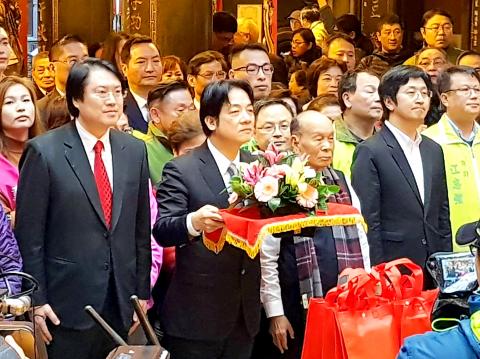The Executive Yuan has set a goal of creating a unicorn company in two years and increasing annual investment in start-ups by NT$5 billion (US$170.64 million) as part of a program to improve the domestic entrepreneurship environment and make Taiwan a regional hub for start-ups.
The Cabinet yesterday announced an action plan to improve the investment environment for Taiwanese start-ups and promise to help incubate the first unicorn business in two years and three other unicorn companies in the next six years.
A unicorn is a start-up that is less than 10 years old with a value of more than US$1 billion without going public.

Photo: Yu Chao-fu, Taipei Times
There are 228 unicorn companies in the world and Taiwan has yet to have its own, National Development Council Minister Chen Mei-ling (陳美伶) said.
“I can promise that there will be a unicorn [in Taiwan] in two years,” Chen told reporters, who asked whether the goal was overly ambitious.
There are three to four Taiwanese companies that have the potential to become a unicorn, she said, adding that the government would not name the companies, as it might affect their fundraising efforts.
While Taiwanese start-ups acquired NT$10 billion in investment last year, the government is set to increase that number by NT$5 billion every year in the next five years to help Taiwan overtake Singapore and become the center of innovation and investment in Asia.
The goals are attainable and were set following discussions with entrepreneurs, who approved the improvements made to the start-up industry by the government, Chen added.
The action plan would help start-ups in early-stage funding, recruit employees, facilitate mergers and public listings, and tap into international markets, the Cabinet said.
To boost fundraising efforts, up to NT$3 million in personal income tax breaks would be offered to angel investors who inject more than NT$1 million in a single start-up, it said.
Restrictions will be lifted to allow the National Development Fund to invest more than NT$1 billion in a single start-up or hold more than 30 percent of its shares, it said.
The Act for the Recruitment and Employment of Foreign Professionals (外國專業人才延攬及僱用法), which took effect on Feb. 8, provides tax benefits, healthcare measures and retirement benefits to attract skilled foreign workers and overseas students, the Cabinet said.
A new set of listing requirements for e-commerce companies that exclude profitability as a requirement is to be implemented next month to make it easier for start-ups to go public.
The Business Mergers and Acquisitions Act (企業併購法) might also be revised to smooth the merger of start-up companies, it said.
The government will also introduce tier-one international start-up accelerators to Taiwan to help local companies connect with global markets.
“Taiwan failed to grasp the business opportunities offered by the Internet and mobile applications, because of its focus on personal computer development at the time. It cannot afford to fall behind the latest trends in artificial intelligence, Internet of Things, financial technology and autonomous vehicles this time,” Premier William Lai (賴清德) said.

Chinese Nationalist Party (KMT) Chairman Eric Chu (朱立倫), spokeswoman Yang Chih-yu (楊智伃) and Legislator Hsieh Lung-chieh (謝龍介) would be summoned by police for questioning for leading an illegal assembly on Thursday evening last week, Minister of the Interior Liu Shyh-fang (劉世芳) said today. The three KMT officials led an assembly outside the Taipei City Prosecutors’ Office, a restricted area where public assembly is not allowed, protesting the questioning of several KMT staff and searches of KMT headquarters and offices in a recall petition forgery case. Chu, Yang and Hsieh are all suspected of contravening the Assembly and Parade Act (集會遊行法) by holding

PRAISE: Japanese visitor Takashi Kubota said the Taiwanese temple architecture images showcased in the AI Art Gallery were the most impressive displays he saw Taiwan does not have an official pavilion at the World Expo in Osaka, Japan, because of its diplomatic predicament, but the government-backed Tech World pavilion is drawing interest with its unique recreations of works by Taiwanese artists. The pavilion features an artificial intelligence (AI)-based art gallery showcasing works of famous Taiwanese artists from the Japanese colonial period using innovative technologies. Among its main simulated displays are Eastern gouache paintings by Chen Chin (陳進), Lin Yu-shan (林玉山) and Kuo Hsueh-hu (郭雪湖), who were the three young Taiwanese painters selected for the East Asian Painting exhibition in 1927. Gouache is a water-based

Taiwan would welcome the return of Honduras as a diplomatic ally if its next president decides to make such a move, Minister of Foreign Affairs Lin Chia-lung (林佳龍) said yesterday. “Of course, we would welcome Honduras if they want to restore diplomatic ties with Taiwan after their elections,” Lin said at a meeting of the legislature’s Foreign Affairs and National Defense Committee, when asked to comment on statements made by two of the three Honduran presidential candidates during the presidential campaign in the Central American country. Taiwan is paying close attention to the region as a whole in the wake of a

OFF-TARGET: More than 30,000 participants were expected to take part in the Games next month, but only 6,550 foreign and 19,400 Taiwanese athletes have registered Taipei city councilors yesterday blasted the organizers of next month’s World Masters Games over sudden timetable and venue changes, which they said have caused thousands of participants to back out of the international sporting event, among other organizational issues. They also cited visa delays and political interference by China as reasons many foreign athletes are requesting refunds for the event, to be held from May 17 to 30. Jointly organized by the Taipei and New Taipei City governments, the games have been rocked by numerous controversies since preparations began in 2020. Taipei City Councilor Lin Yen-feng (林延鳳) said yesterday that new measures by